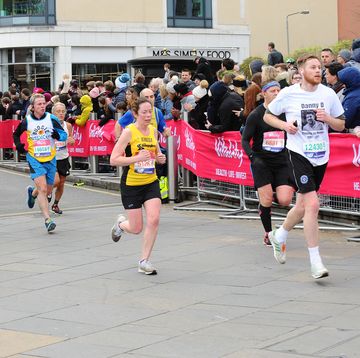Running a marathon in under four hours is often the first goal runners set themselves when they are looking to do more than just get round. In the UK the average marathon time is between four and five hours so going sub 4:00 is a great goal to aim for. With the right training and commitment a sub 4 marathon is achievable for most runners but it will depend on your starting point. You will need to commit to five runs a week of varying length and intensity.
So is this the training plan for me?
A 4:00 hour marathon is approximately 9:00 per mile. To break 4:00, you should eventually be capable of a sub-1:50 half-marathon (8:20 per mile) and sub-50:00 10K (8:00 per mile). Right now, you should be running at least 20 miles per week, and be able to run for an hour non-stop.
What do the different runs on the training plan mean?
Rest/Cross-Train (XT) – Take a rest day, or do moderate cross-training with a no-impact activity such as yoga or swimming.
Tempo – Run easy for one mile to warm up. Then ease into the given pace for the distance show. Run easy for a mile to cool down. Tempo runs should feel challenging; on a scale of one to 10, your effort will feel like a seven or eight. You should be able to utter just a few words at a time. These runs train your body to sustain speed over distance.
Easy – Easy runs should be done 30 seconds to one minute per mile slower than your marathon goal pace. Around 80% of your training should be at this pace.
Long run – Much like an easy run, this is a long, slow distance run that will build your endurance. Run at an easy pace; you should be able to hold a conversation. This should be 30 seconds to one minute per mile slower than your goal pace.
Mile repeats – After a one-mile warm-up, run one mile at the given pace, then jog very slowly for half a mile to recover. Repeat cycles as directed. Cool down with one mile of easy running.
Marathon pace – This is the pace that you hope to maintain in the race. Run one mile easy to warm up and one mile easy to cool down.
What pace should I be doing each run at?
Work out what pace to do each of your runs at using our training pace calaculator - just tell us a recent run time and we'll do the rest. As well as the runs, the training plan includes those all important rest days - make sure you use these properly to avoid burning out or getting an injury. Adaptation to the body occurs when we rest so the only way to improve is to take rest and recovery seriously.
I've missed a week of the plan, what should I do?
Very few runners will get to the end of their marathon training schedule without missing some runs due to illness, injury or life getting in the way. If you’ve missed four weeks or more, our best advice is to postpone your marathon, as it’s unlikely you’ll be able to get the time you want on race day having missed a month.
If you’ve missed two or three weeks, you should still have time to build up to your longest training runs, which are a key to race-day success. If you are coming back from injury, spend a week or two gradually increasing your training volume, using previous weeks on the training plan as a guide.
How can I avoid getting injured?
The two most common causes of injury are training load error and lack of strength training. If you push too hard and don't manage your training load correctly you are far more likely to end up with an injury which might mean you have to pull out of the race altogether. Stick to the training plan and don't add additional runs or harder sessions. Your body needs time to adapt. If you are burning to do more then low impact cross training like swimming, cycling or yoga is a better option than more running.
It is also vital to develop a strength and conditioning training programme alongside your running. This will strengthen all your muscles and stave of repetitive strain and overloading injuries. Strength work twice a week is the ideal amount and you don't need to join a gym. With resistance bands and body weight you can create a great strength session. As with running make sure you build up your strength work gradually to enable the muscles to adapt.
What should I eat during my training?
As you run further and at higher intensities your body will need more fuel. This will mean increasing your carb intake to ensure you have enough glycogen stores in your muscles and eating more protein after a long or hard training session to aid recovery. Listen to your body and fuel yourself accordingly. You will be burning a lot more calories so you will need to eat more. It is also important to stay hydrated and to absorb electrolytes particularly as you start running longer distances. Practice carrying food and water with you on your long runs and find out what fuel you can stomach.
RW's 16-week sub 4:00 marathon training plan:
Week One (19M)
Mon 3M (miles) (or 30 mins, if you prefer to train by time) easy
Tue Rest
Wed 4M (40 mins) easy
Thu 2M (18 mins) marathon pace
Fri Rest
Sat 3M (30 mins) easy
Sun 7M (70 mins) easy
Week Two (25M)
Mon Rest
Tue 5M consisting of the following: 1M jog, then 2 x 1.5M (or 13 mins) tempo pace, with 400m (3-min) jog recoveries between sets, then 1M jog
Wed 5M (50 mins) easy
Thu 1M jog, then 2M (18 mins) marathon pace, then 1M jog
Fri Rest
Sat 3M (30 mins) easy
Sun 8M (80 mins) easy
Week Three (29M)
Mon Rest
Tue 6M consisting of the following: 1M jog, then 3 x 1M (or 8:30 mins) tempo pace, with 400m (3-min) jog recoveries between sets, then 1M jog
Wed 6M (60 mins) easy
Thu 1M jog, then 3M (27 mins) marathon pace, then 1M jog
Fri Rest
Sat 3M (30 mins) easy
Sun 9M (90 mins) easy
Week Four (27M)
Mon Rest
Tue 5M consisting of the following: 1M jog, then 4 x 800m (or 4 mins) tempo pace, with 200m (2-min) jog recoveries, then 1M jog
Wed 7M (70 mins) easy
Thu 1M jog, then 2M (16 mins) brisk, then 1M jog
Fri Rest
Sat 3M (30 mins) easy
Sun 1M jog, then race 10K or 5M, then 1M jog. Aim for a sub-50:00 10K or sub-40:00 5-miler
Week Five (30M)
Mon Rest
Tue 1M jog, then 4M (or 40 mins) fartlek, then 1M jog
Wed 5M (50 mins) easy
Thu 5M (50 mins) easy
Fri Rest
Sat 3M (30 mins) easy
Sun 11M (1hr 50) easy
Week Six (33M)
Mon Rest
Tue 6M consisting of the following: 1M jog, then 8 x 2 mins uphill, jog back down. Then 1M jog at end of session
Wed 6M (60 mins) easy
Thu 1M jog, then 3M (25 mins) tempo, then 1M jog
Fri Rest
Sat 3M (30 mins) easy
Sun 13M (2hrs 10) easy
Week Seven (37M)
Mon Rest
Tue 6M consisting of 1M jog and strides, then 10 x 400 at 5K pace, with 200m (1-min 30) jog recoveries between reps, then 1M jog
Wed 7M (70 mins) easy
Thu 6M (60 mins) easy
Fri Rest
Sat 3M (30 mins) easy
Sun 15M (2hrs 30) easy
Week Eight (31M)
Mon Rest
Tue 5M consisting of the following: 1M jog and strides, then 12 x 200m at mile pace, with 200m (1-min) jog recoveries between reps, then 1M jog
Wed 7M (70 mins) easy
Thu 1M jog, then 2M (16 mins) tempo pace, then 1M jog
Fri Rest
Sat 3M (30 mins) easy
Sun Race (ideally half-marathon) (15M inc warm up/ cool down)
Note that the ‘approximate’ targets for training sessions are exactly that, especially on longer runs. By now, your training and racing should be giving you a clearer idea of your marathon (steady) and half-marathon (brisk) paces. Also, the times in the Tuesday speed sessions are alternatives to the distances, rather than targets. You should be running them as fast yet evenly as you can; roughly between 5K and 10K pace.
Week Nine (41M)
Mon Rest
Tue 6M consisting of the following: 1M jog and strides, 10 x 90 seconds uphill, jog back down, then 1M jog at end of session
Wed 7M (70 mins) easy
Thu 8M (80 mins) easy
Fri Rest
Sat 3M (30 mins) easy
Sun 17M (2hrs 55) easy
Week Ten (38M)
Mon Rest
Tue 7M consisting of the following: 1M jog, 3 x 1.5M (or 13mins) tempo, with 400m (or 3-min) jog recoveries between reps, the 1M jog
Wed 8M (82 mins) easy
Thu 1 mile jog, then 3M (26 mins) tempo, then 1M jog
Fri Rest
Sat 3M (30 mins) easy
Sun Half-marathon. Aim for sub-1:50 (15M inc warm up and cool down)
Week Eleven (43M)
Mon Rest
Tue 1M jog, then 5M (or 50 mins) fartlek, then 1M jog
Wed 6M (60 mins) easy
Thu 8M (80 mins) easy
Fri Rest
Sat 3M (30 mins) easy
Sun 19M (3hrs 15) easy
Week Twelve (43M)
Mon Rest
Tue 7M consisting of: 1M jog and strides, 4 x 1M (or 9 mins) marathon pace with 200m (or 90 secs) jog recoveries, then 1M jog
Wed 7M (70 mins) easy
Thu 1M jog, then 3M (26 mins) tempo, then 1M jog
Fri Rest
Sat 3M (30 mins) easy
Sun 21M (3hrs 35) easy
Week Thirteen (42M)
Mon Rest
Tue 6M consisting of the following: 1M jog and strides, then 10 x 90 seconds uphill, jog back down, then 1M jog at end of session
Wed 7M (70 mins) easy
Thu 1M jog, 4M (34 mins) tempo, then 1M jog
Fri Rest
Sat 3M (30 mins) easy or parkrun
Sun 20M (3hrs 25) slow
Week Fourteen (39M)
Mon Rest
Tue 1M jog, then 6 x 800m (or 4 mins) at 10K pace, with 100m (or 1-min) jog recoveries between sets, then 1M jog
Wed 6M (60 mins) easy
Thu 7M (70 mins) easy
Fri Rest
Sat 3M (30 mins) easy
Sun 18M (3hrs 05) easy
Week Fifteen (30M)
Mon Rest
Tue 5M of the following: 1M jog, then 8 x 400m (or 90 secs) at 5K pace, with 200m (or 2-min) jog recoveries between sets, then 1M jog
Wed 5M (50 mins) easy
Thu 1M jog, then 3M (25 mins) tempo, then 1M jog
Fri Rest
Sat 3M (30 mins) easy
Sun 12M (2hrs) easy
Week Sixteen (35M inc race)
Mon Rest
Tue 4M consisting of the following: 1M jog, then 10 x 200m (or 45 secs fast) at 5K pace, with 100m (or 30 secs) jog recoveries between sets, the 1M jog
Wed 3M (30 mins) easy
Thu Rest
Fri Rest
Sat 2M (or 20 mins) easy
Sun Race day
This isn't the right plan for me - what now?
If you're not sure this is the training plan you want to follow, head to our marathon training guide to look at all of our free marathon training plans.













